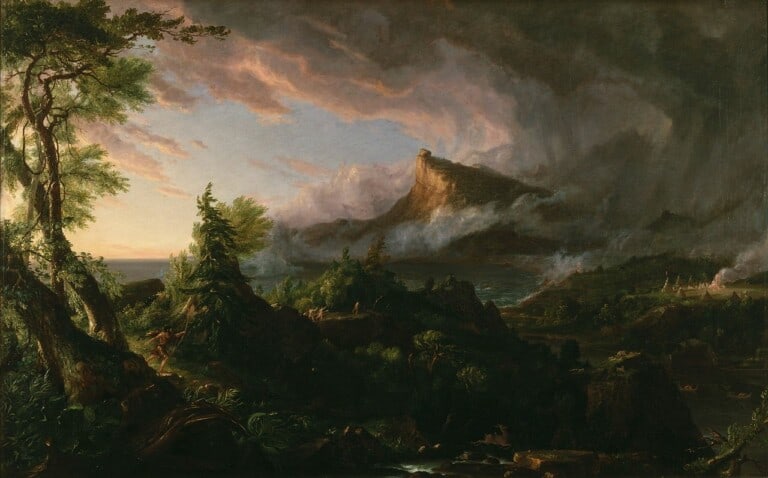Ralph Waldo Emerson
Emerson’s literary and philosophical importance in the American Renaissance and after it has always been associated with his lasting influence in two domains of American intellectual and social life:
- The emergence of an American romantic sensibility.
- The emergence of a characteristically American conception of individual consciousness and actions.
For the first time in America, Emerson gave full expression to a philosophy of romantic idealism.
He thought that the spiritual and intellectual ideals of the 18th century, the principles of the Age of Reason, had ended in sterility. Emerson’s ethic of self-reliance represents the necessity for the individual to question most of all forms of social conventions and to refuse his ideas by the accepted standards and values of society.
Also, it represents the necessity for the individual to think and act according to his standards.
But this self-reliance can also be interpreted as moral relativism and as a certain cult of individualistic power. Indeed, Emerson’s philosophy does reflect a certain fascination with power.
Very often, he seems to be too enthusiastic about all manifestations of energy, personal force and superior vitality: “Power first. In politics and trade, pirates are of better promise than talkers and clerks”: it’s a philosophy of action.
Such ambivalent affirmations show a great deal of the liberating potential of Emerson’s philosophy but evidently, they also hide a dangerously anarchistic potential that can not be denied.
Henry David Thoreau
Is the spiritual son of Emerson: he did what Emerson said and tried to act according to the philosophy of self-reliance.
One of the most important observations that can be made about Thoreau’s life as a man and as an artist is that he considered freedom as the highest ideal of society.
His life as a writer and as a thinker was dedicated to the freedom of trying new ideals and new experiences.
Also, freedom for Thoreau meant the possibility for the individual to discover himself and to live his life against social conventions. To accomplish his ideal of freedom, Thoreau went to live at Walden Pond in 1845. This decision was essentially determined by three tendencies in Thoreau’s personality.
As a man, he wanted to explore and discover new aspects of his personality.
As an intellectual, he wanted to experiment with a new form of life different from life in an organized complex capitalistic society.
As a writer, he wanted to explore and experiment with his writing. In this respect, Thoreau’s experience marks the beginning of the essay as lived experience.
Concerning Thoreau’s experience as a writer, his poetry and prose reflect the work of a very careful artist: a great deal of attention to the nuances of the language.
It may appear spontaneous, even like a conversation but it is not. His prose is carefully studied. He’s always addressing the reader.
Walden is representative of Thoreau’s style. It is quite artful and elaborate. Yet, it appears to be artistically modest. The ideals are complex and sophisticated. Yet, it appears to be simple.
Simplicity in Thoreau’s is not just a literary characteristic of Walden, it also incarnates the ideal of an intellectual who wants to limit life to the simplest activities.
Thoreau came to Walden Pond to make a fresh start, and to see intellectual and natural experiences directly. He did not look for inspiration in books but in Nature.
He established a real tradition of individualism: life in Nature is by necessity a separation from society and its conventions. Consequently, the writer’s position outside society becomes the best place to observe society and its institutions with critical eyes.
Through this return to Nature, Thoreau wants to move away from the regulations of a materialistic and instrumental society. He wants to reorganize his life according to his philosophy.
At the beginning of the essay, Thoreau uses ironic expressions for his new experience: “a private business”. To call this escape from the materialism of society a “business” is irony and Walden becomes the story of this escape.
It reminds us of Zen Buddhism or Hindu mysticism: his life in nature seems to be a form of sacrifice to reach a higher transcendent state of being.
Even when Thoreau describes himself building his cabin, we have the impression that the business of building is also a religious ceremony of purification and renewal.
Therefore, Thoreau belongs to the American tradition of renewal, a sort of symbolic baptism of the individual through an escape to nature.
Nathaniel Hawthorne
Nathaniel Hawthorne is much more pessimistic about human nature: he doesn’t believe in a new beginning: to him, the past comes back to haunt the present. He wrote short stories and novels with a complex and disturbing aspect of American life.
His literary imagination was strongly influenced by his early life in Salem (Massachusetts) where he was born.
The history of Salem and American Puritanism presented the context in which he developed his ideas about human nature and the ambivalent nature of human psychology, and about sin and guilt, the dangers of the intellect, and the risks of passion.
Later, when he lived in Concord (Massachusetts), Hawthorne dedicated his efforts to sketches and short stories, called “Allegories of the Heart”. His novels are “romances”.
In both short stories and novels, Hawthorne was excellent at describing the complexities and ambiguities of human psychology.
According to Hawthorne, the human mind is determined by a division between sensuality and repression of sensuality, conformity and individualism. It is also the scene of a dialectical conflict between good and evil.
His fictions represent the co-existence of contradictory forces on the individual. Hawthorne is a romantic author whose short stories and novels are marked by a concern with the American past with the role of the creative artist in a materialistic society.
He insisted on the importance of human emotions and imagination and the dangers of cold intellect.
Henry James and Edgar Allan Poe criticized Hawthorne for being too allegorical in his style. Hawthorne himself admitted that his allegorical style is vague and not easy to understand: “I am not quite sure that I entirely comprehend my own meaning in these blasted allegories”.
In his “Allegories of the Heart”, Hawthorne uses symbols to represent the narrow separation between good and evil in the human mind.
Through his allegorical technique, he shows that humankind can never solve the mysteries and the ambiguities of a divided human psychology. Hawthorne’s moral and religious concerns are central to his literary symbolism.
His most representative symbols were derived from the Puritan history of New England. He developed his themes about good and evil around the historical events and the personalities that influenced New England culture and society.
Walt Whitman
Along with Emily Dickinson, Walt Whitman stands in the literary history of America as the poet who generated the most dramatic and lasting transformations in American poetry and the function of the American poet.
Indeed, Whitman redefined poetry and the role of the poet in, at least, two important ways:
- In terms of aesthetic practice
- In terms of the social position of the poet as an active participant in a democratic society
As far as his aesthetic practice is concerned, Whitman considered the poet essentially an experimental artist first and foremost: the poet’s function is to create both new forms and new themes for poetry.
The poet must re-create a literary tradition: conventions were out. In Whitman’s dynamic and revolutionary conception of poetry, there are 2 important consequences:
- Rhyme would not matter: would have no importance at all.
- Uniformity in the structure of stanzas should be abandoned.
Concerning the thematic content of new poetry, Whitman also expressed his opinion quite clearly. The new American poet would avoid sentimental poetry and simplistic moralization: he is no longer a moral teacher.
Also, exaggeration in style and subject would be replaced by realistic descriptions of life and its impressions. Whitman would abandon any sentimental idealism.
As far as his intellectual influence is concerned, he believed reading literary texts should not be limited to an elite of intellectuals. Whitman thought it was possible to include the people in the experience of literature.
He wanted to make literature a popular art: the poet can come to play an important role in exalting the people. Through his capacity to sing (to exalt) and encourage the people, the poet also indicates the way to collective self-realization and self-realization for each individual.
Whitman, therefore, believed that literature, as an instrument of communication, was also a democratic instrument. With Whitman, we realize that his analysis of democratic society can not be separated from his conception of poetry.
This relationship is reflected in the poem Song of Myself. According to Whitman, Song of Myself depends on the creative participation of each reader. It is in this context that he defines the great poet as a bridge between the reader and society at large.
It is this definition of the poet that he affirmed in the opening lines of Song of Myself:
“I celebrate myself and sing myself
And what I assume you shall assume”.
Walt Whitman, Song of Myself

